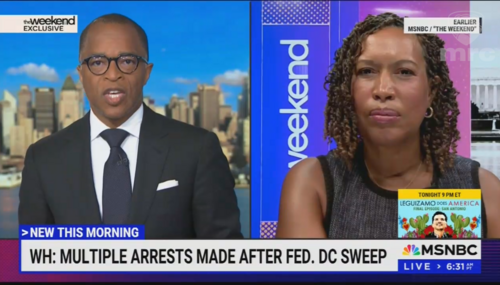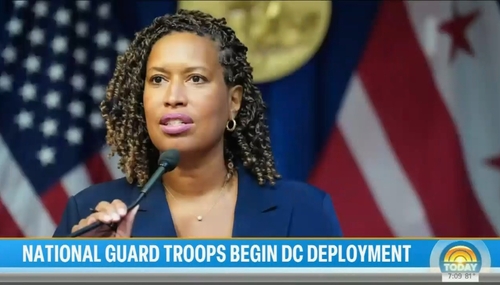 The headline is that Ann Redington, Libby juror #10, wants Scooter to get a pardon. But there's actually a bigger story. It is Redington herself. If you have a chance to watch a replay of her appearance on this afternoon's Hardball, billed as an exclusive, I'd urge you to do so. She is enough to renew one's faith in the goodness and intelligence of our fellow Americans.
The headline is that Ann Redington, Libby juror #10, wants Scooter to get a pardon. But there's actually a bigger story. It is Redington herself. If you have a chance to watch a replay of her appearance on this afternoon's Hardball, billed as an exclusive, I'd urge you to do so. She is enough to renew one's faith in the goodness and intelligence of our fellow Americans. As Matthews observed, Redington demonstrated an impressive ability to separate the wheat from the chaff in the trial, and appeared open, honest and without any political ax to grind.
View video here. The clip is longer than usual because I consider Redington's comments to be of historical and cultural significance.
Excerpts from the interview:Matthews: "What did you think of Scooter?"
Re: I thought he seemed like a really nice guy. It wouldn't matter if he were a nice guy or not, the whole thing was obviously very difficult to have someone's future in your hands. But he seemed like a ton of fun."Matthews: "What do you think his motive was to break the law/"
Redington: "I think he caught difficult situation where he got caught in the initial lie and it kind of snowballed.
 Matthews: ""What did you think of the prosecutor, Fitzgerald?"
Matthews: ""What did you think of the prosecutor, Fitzgerald?"Redington: "Very earnest, nice person."
Matthews: "Almost virginal, right? Didn't he seem like a real straight-arrow? Like he never had been married, never had a date, never had a hangover, never had anything?"
Redington, with a smile: "No."
Matthews: "What did you think of Ted Wells, the impressive-looking defense attorney?"
Redington: "Quite flamboyant, very entertaining to watch. I thought Mr. Jeffers [co-defense counsel William Jeffers] was fantastic."
Matthews: "What did you make of that very emotional appeal by Mr. Wells as the end?
Redington: "To give Scooter back to him? It wasn't germane to anything."
Matthews: "Was it pathetic?"
Redington: "No, it wasn't pathetic. He was caught up in the moment. . . What the lawyers said in the closing arguments, that's not the trial. The trial is the evidence and not what the lawyers say in their closing arguments." Precisely.
Matthews: "You were known to have cried during the reading of the verdict."
Redington: "It was very emotional. . . I'm not a big weeper in real life, but it was very difficult."
Matthews: "Jeepers creepers, why were you a weeper?"
Redington: "Because it was hard. I didn't want to have to see him and his wife, and say we think you're guilty of a crime. It's a hard thing to do."
Matthews: "So there was certainly nothing in your heart that was vengeful, you were doing what you thought you had to do. And yet you did it against a person you so liked. . . Did you feel affection for him?"
Redington: "Sure, yeah, he looked like a really nice guy."
Matthews: "You seem like such a human, nice person. You say you're not very political, you told me in the make-up room."
Redington: "Correct."
Matthews: "Here's a question that is more human than political. Scooter Libby is eligible, as is any American who's been convicted of a crime, for a pardon from the president. Do you think he should get one?"
Redington: "Whether or not he should get one, I don't know if I have a valid opinion. But I would like him to get one."
Matthews: "OK, that's a valid opinion. Do you think he should get one now, when it might cost the president a little trouble but would keep him out of federal prison. or do you think he should get one at the end of the term when the president could do it like midnight Christmas Eve when no one is watching? What would be more appropriate?"
Redington: "It certainly would be interesting if he got one now. It would be more interesting to follow. Obviously, tt would create work for you,"Matthews: "What did you make of the prosecutor's closing summation where he said 'the Vice-President is under a cloud'?"
Redington: "Rhetoric."
Matthews:"God, you're tough. You're great. Rhetoric. God I like the way you separate the wheat from the chaff. You've decided on the wheat, and the wheat is a conviction, but you cry for this guy."
Redington: "It was awful."
Matthews: "And you want him pardoned."
Redington: "I don't want him to go to jail."
Matthews summed up: "Thank you dear, you're a very nice person." Indeed.
I wrote the opening paragraph of this item on the fly, before a later segment in which Howard Fineman among others appeared. Interesting, then, how much Fineman's awestruck reaction to Redington paralled my own. He took things a step further, stopping just short of proposing to the former juror. Invited by Matthews to ask her a question, Fineman said:
"Where have you been all my life? I would like to say if anyone had any doubts about the strength of the American jury system and how things work, sitting there and listening to her, I think it would restore their faith. This is what juries are supposed to do, what they're supposed to be about. I will use my time to congratulate her for her services."
Right on, Howard. Brava, Ann Redington.
Contact Mark at mark@gunhill.net




